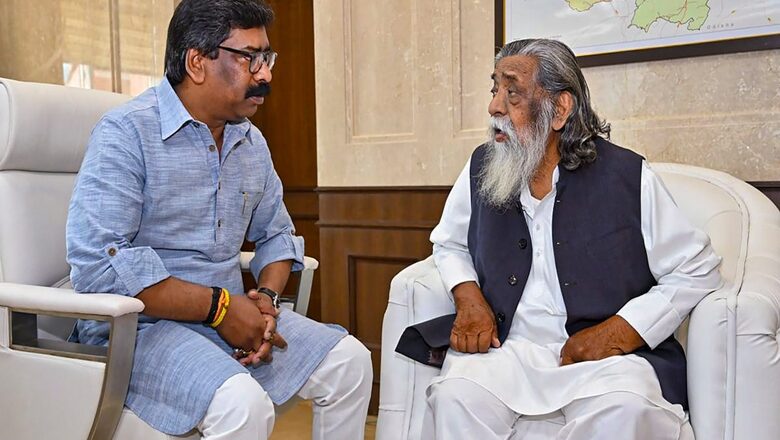
views
In an interesting turn of events, Sita Soren, a Jharkhand MLA and the daughter-in-law of Jharkhand Mukti Morcha (JMM) supremo Shibu Soren, has inadvertently opened a can of worms for her father-in-law in a 30-year-old cash-for-vote scam.
Sita Soren, who allegedly accepted a bribe to vote for an independent Rajya Sabha candidate in 2012, sought immunity under Article 194(2). The article states, “No member of the legislature of a state shall be liable to any proceedings in any court in respect of anything said or any vote given by him in the legislature or any committee thereof.” A corresponding article for Parliament, Article 105(2) was relied upon by a five-judge bench in 1998 to absolve Shibu Soren from culpability in a similar cash-for-vote scam.
Shibu Soren and three of his associates — Simon Marandi, Shailendra Mahto, and Suraj Mandal — voted in 1993 in the Parliament to defeat a no-confidence motion against the incumbent Narasimha Rao government at the Centre. Incriminating evidence was found against them to have accepted bribes to vote against the motion. Rs 30 lakh cash was deposited in the Delhi PNB account of the then MP Suraj Mandal on August 1, 1993, four days after the JMM MPs had voted with the government to defeat the no-confidence motion.
The members even admitted during their trial under the Prevention of Corruption Act that they had received money from the Congress in 1993 for their support to the confidence motion. However, a Supreme Court bench acquitting them, ruled that they had immunity for any acts committed inside the Parliament under Article 105(2). Ironically, the same immunity wasn’t extended to Ajit Singh who had chosen to abstain from voting after allegedly taking a bribe. The decision thus protected those who had voted after receiving a bribe but not those who abstained after receiving a bribe in the same case. As bizarre as it sounded, the verdict not only exonerated MPs who had dealt a severe blow to the sanctity of democratic processes but also paved the way for others to misuse the immunity. Two subsequent challenges to the decision were not entertained by the apex court.
It looked like a deja vu, two decades later when the CBI chargesheeted Shibu Soren’s daughter-in-law Sita Soren in an alleged case of horse trading during the 2012 Rajya Sabha elections in Jharkhand. Sita Soren is the widow of Shibu Soren’s elder son, Durga Soren, once considered the natural successor to Shibu’s political legacy.
Sita had allegedly received money from RK Agarwal, an independent candidate in the 2012 Rajya Sabha polls. Income tax officials had seized Rs 2.15 crore in cash on the day of the election. The polls were countermanded, and a chargesheet was filed against her as well as her father and private secretary as co-accused.
Interestingly, the prosecution as well as defence, both relied on the same 1998 judgement to support their argument. The prosecution argued that since Sita Soren eventually didn’t vote for the candidate after receiving a bribe, just like Ajit Singh, she shouldn’t be accorded immunity. The defence quoting the same judgement, sought immunity citing article 194(2). What felt like a clever escape through a constitutional loophole has come back to bite the original decision and its beneficiaries too.
The three-judge bench hearing Sita Soren’s plea referred the case to a five-judge bench since it involved the interpretation of the original 1998 decision. The CJI-headed bench has further referred it to a seven-judge bench citing the need for the previous 1998 majority view to be considered. The CJI-headed bench noted in its decision: “The purpose of Articles 105(2) and 194(2) is to ensure that members of Parliament and assemblies are able to discharge duties in an atmosphere of freedom without fear of the consequences that may follow. The object clearly is not to set apart the members of the legislature as persons who wield higher privileges in terms of immunity from the application of the general criminal law of the land which citizens of the land do not possess.”
Jharkhand has often been the first in terms of such political machinations. This marred the first fifteen years of the state with unstable governments and policies which kept changing like a flip of cards. The unprecedented appointment of Madhu Koda, an independent MLA as the chief minister was an outcome of such machinations, a feat unimagined anywhere else in India.
Currently, the younger Soren and Jharkhand CM, Hemant, is also facing heat from the ED in a number of corruption cases including the Sahibganj mining scam, land allotment and money laundering cases. The Supreme Court last week declined to entertain Hemant’s plea against ED’s action, granting him the option to approach the High Court. However, with incriminating evidence against Hemant, he is unlikely to get any relief from HC either. ED has already issued five summons to Hemant and wouldn’t be long before he has to finally appear and answer questions on a range of corruption issues. The troubles for Jharkhand’s first family seem to be piling up with Shibu Soren also getting added to the list of Hemant and Sita who would have to face the music for their misdemeanours soon.
The author is Election Management Chief, BJP Jharkhand and has earlier worked in various bureaucratic and corporate roles. He holds an Engineering Degree from BIT Mesra and an MBA from XLRI, Jamshedpur. Views expressed in the above piece are personal and solely that of the author. They do not necessarily reflect News18’s views.




















Comments
0 comment